IN-DEPTH
On a late summer day in 2023, back when temperatures neared 100 degrees, siblings Mark and Patty Arnold sought refuge from the sun under the awning at the Connecting Grounds Outreach Center.
The Connecting Grounds is a church that helps the unsheltered community in Springfield. Its Outreach Center at 3000 W. Chestnut Expressway is one of the few places in Springfield where homeless people can hang out and rest during the day.
Patty, 65, had just been released from the hospital and was still wearing scrubs, no-slip hospital socks and a plastic wristband.
They’d been evicted recently because a so-called friend stole their rent money. For a time, they lived in their car. But 62-year-old Mark crashed it while rushing Patty to the hospital.
Mark explained he isn’t in good health and was not supposed to be driving.
As they shared stories about their predicament, the brother and sister hung tightly to the leashes of their small dogs, Daisy and Bobo.
The Arnolds seemed exhausted, hot and frightened. This would be their first night outdoors.
“We don’t know where we are going to go,” Mark Arnold said, shrugging.
“I’ve never been out like this before,” Patty Arnold added.
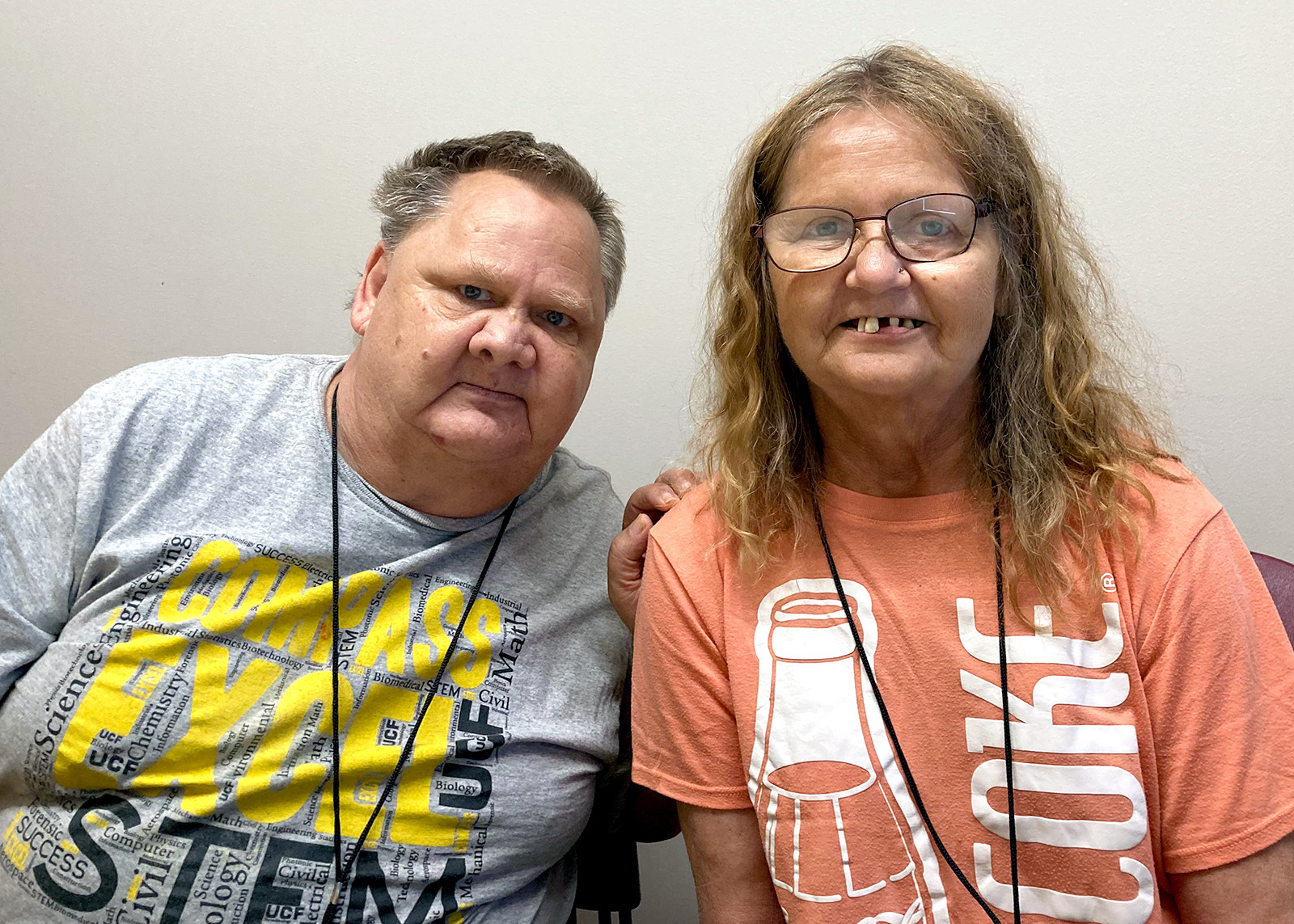
The siblings and their dogs later made their way from the Outreach Center to the Revive 66 Campground about a mile away only to find all the tiny campers had been rented.
That night, Mark and Patty Arnold slept outside in a nearby parking lot with their backs propped against a pole.
“It was bad. It was real bad,” Patty Arnold later recalled. “It was hot. We had both dogs.”
The following day, Patty and Mark Arnold went to One Door, Springfield’s “point of entry” to resources for the homeless. Most likely due to their health risks and age, the Arnolds were referred to The Kitchen, Inc., a nonprofit that works to end homelessness through affordable housing programs. The Arnolds were immediately placed in The Kitchen’s Emergency Shelter while they worked with a case manager to find a landlord who would work with them on long-term renting.
“It’s wonderful,” Patty Arnold said of The Kitchen’s Emergency Shelter. “Very nice people. I like it here.”
Elderly unsheltered population growing in the Ozarks, nationwide
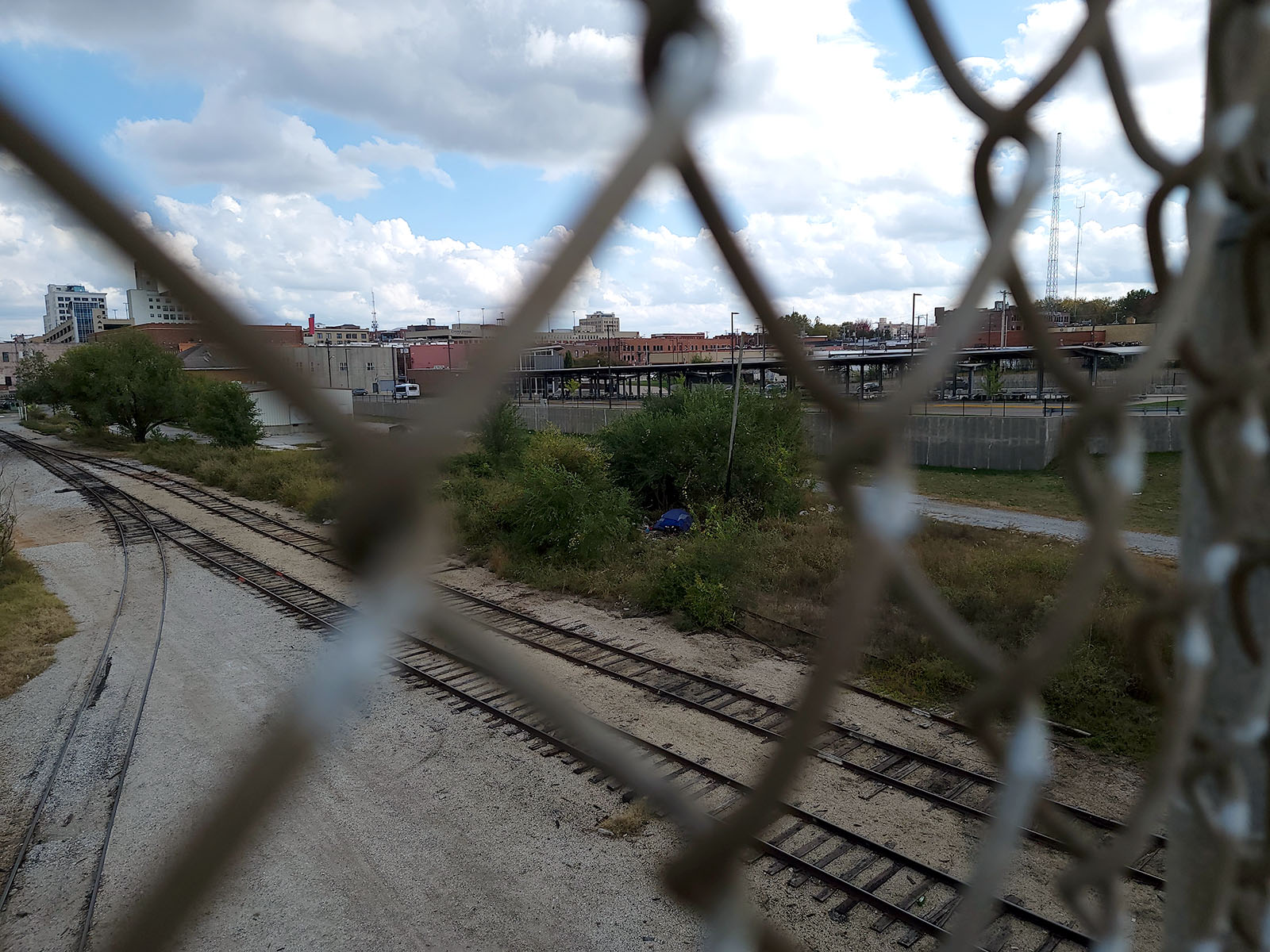
In some ways, the Arnolds were fortunate. Rather than lingering unsheltered on the streets of Springfield for months or years, their stint with homelessness — most of which was spent living in their car — was resolved in less than two months.
According to the National Alliance to End Homelessness, homelessness among older adults in the United States is expected to nearly triple by 2030, with the population of adults aged 65 and older experiencing homelessness is anticipated to grow from 40,000 to 106,000.
Mirroring the national trend, most agencies in Springfield that serve the unsheltered community are noticing an increase in the number of elderly people who are experiencing homelessness. This population tends to be in poorer health, mentally and physically, and are often vulnerable to financial scams and exploitation.
One Door saw 94 new individuals aged 62 and older experiencing homelessness in Springfield in fiscal year 2021-2022. That number jumped to 104 in fiscal year 2022-2023.
In July 2023, 14 individuals over the age of 65 came to One Door seeking assistance — the highest number in any one-month period, according to Adam Bodendieck, Community Partnership of the Ozarks’ director of Homeless Services, Affordable Housing and Homeless Prevention.
One Door’s numbers do not capture the total number of elderly people who are unsheltered in Springfield. Instead, One Door’s data reflects individuals who are on the active prioritization list, meaning they have completed or updated a housing assessment at One Door within the last 90 days.
The Kitchen, Inc., Connecting Grounds also see more elderly people on Springfield’s streets
Theresa Oglesby, The Kitchen’s director of Programs and Compliance, said she’s been keeping a close eye on the growing number of elderly unsheltered people for the past few years.
“I have a heart for our older population,” Oglesby said. “The older they get, they are more at risk of dying on the streets.”
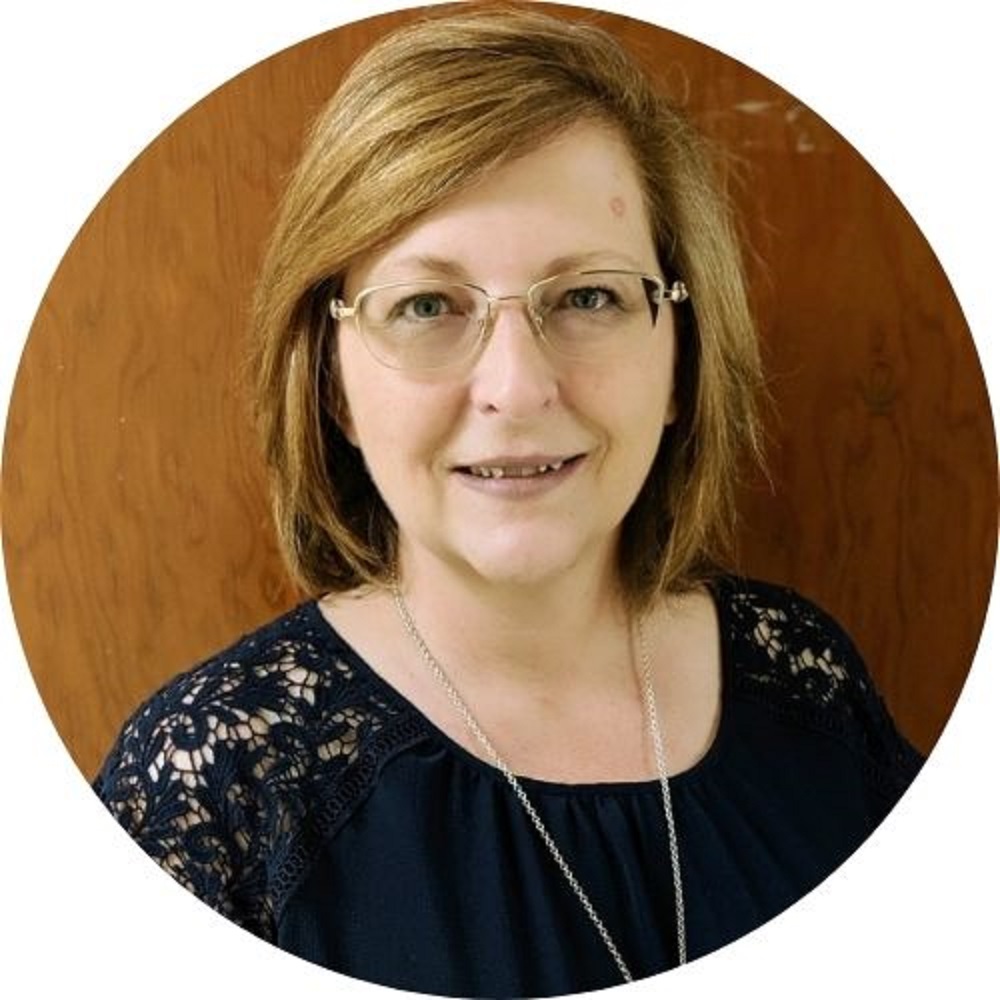
Looking at data from The Kitchen, Oglesby pointed the rapidly growing number of people in their late 50s who are either unsheltered or at risk of losing their housing.
This population is particularly vulnerable, Oglesby said, because they are not yet eligible for Social Security benefits, yet many are unable to work.
In 2017, The Kitchen served 65 individuals who were aged 55 to 61. That number has steadily increased, spiking in 2021 to 97 individuals.
The Kitchen has seen a sharp increase in the number of clients who are 62 or older in the past six years. In 2017, The Kitchen served 29 individuals aged 62 or older. That number spiked in 2021 to 77. In 2022, The Kitchen served 62 people aged 62 or older.
From July to October of this year, The Kitchen has served 65 people aged 55 to 61 and another 49 people who are 62 or older.
The Connecting Grounds Outreach Center is face-to-face with the unsheltered population every day and uses its “street census” to track data about people who are unstably housed. When people come to the Outreach Center for services or are encountered on the streets by the Connecting Grounds Outreach Teams, their information is entered into the street census database.
According to the church’s street census, there are currently 159 unsheltered people in Greene County who are age 55 and older. Some of these people are likely counted by One Door’s data, as well.
Safe to Sleep, an overnight shelter for women, began experiencing an increase in elderly guests about five years ago.
Jessica Luraas, volunteer coordinator with Safe to Sleep, said she sees a growing number of barriers to stable housing popping up for older people.
“It's especially difficult for seniors and people on fixed disability incomes. Rents are rising and landlords are getting more and more restrictive in terms of rental history,” Luraas wrote in an email. “Working a full time minimum wage job is not enough to afford a decent studio apartment in Springfield. Income based properties are a great option for many of our ladies but they also have lots of restrictions, they will deny for bad credit, previous evictions or just past landlord debt and criminal past (not just felonies).
“If they qualify, waitlists are at least one year for most places,” Luraas wrote. “For some of the women at Safe to Sleep, their only option is weekly rentals at a sketchy motel, if they are lucky to afford that.”
‘Think about coming to this stage in life … It’s heartbreaking’
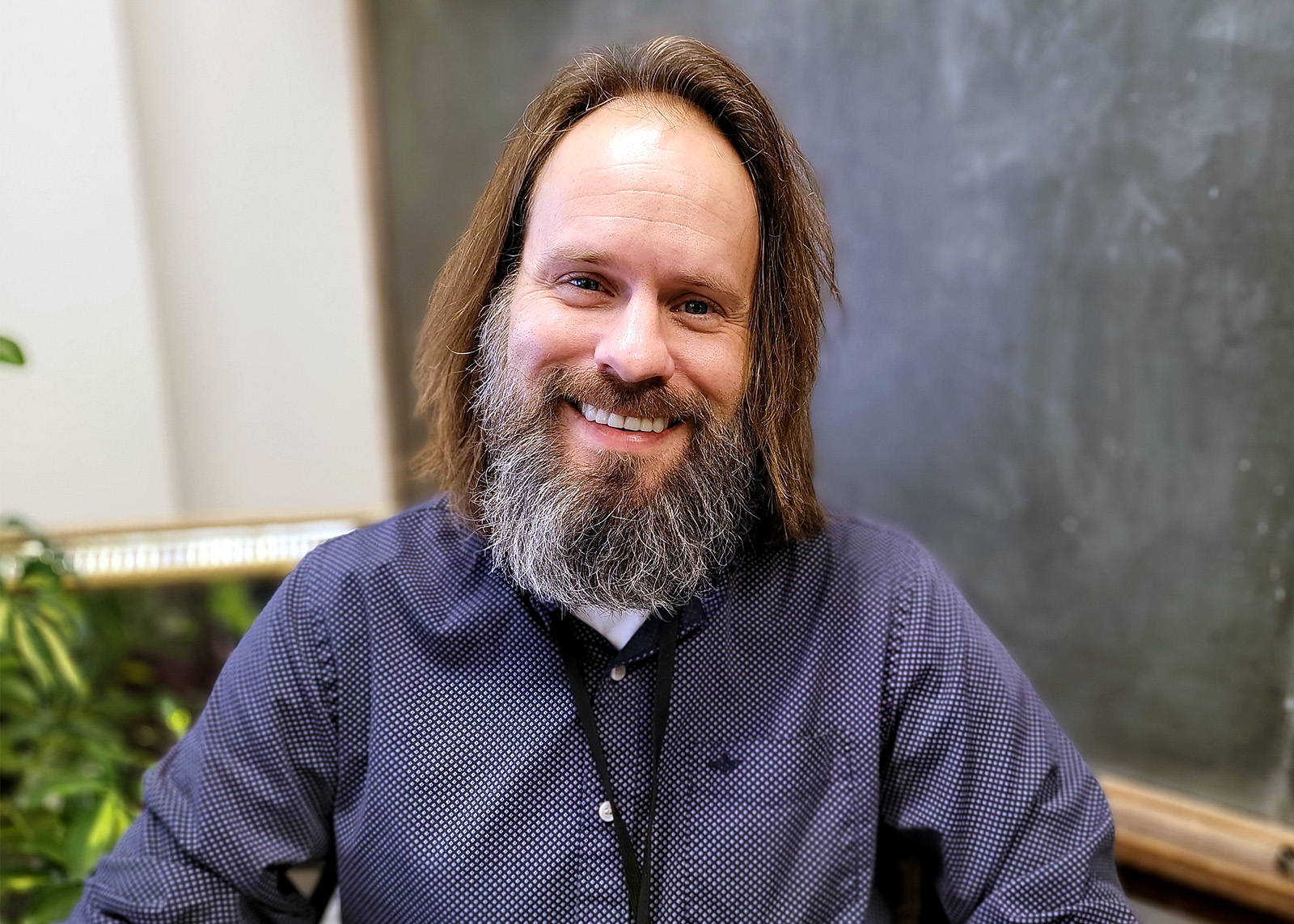
Bodendieck said it’s important to keep in mind there are two different types of elderly unsheltered populations — those who have been chronically homeless for years and are aging, and those who are becoming homeless for the first time at older ages.
For the most part, those who have been chronically homeless for years are persons who have experienced trauma, mental illness and/or substance use disorder.
For those becoming homeless for the first time at an older age, the lack of affordable housing is the major issue, Bodendieck said.
“If you have somebody who is on a fixed income,” he said, “they are rent burdened. And then the place where they’re staying, the owner decides to sell, there’s new ownership. And then the new management decides to raise the rent. A lot of times, that is putting people out of their housing.”
Bodendieck said people often lose their housing due to expensive medical issues.
“Somebody has a heart attack. Somebody has a stroke. Suddenly, they have medical bills that they’re paying,” he said. “Sometimes we have people who are exiting or being exited from residential care facilities for whatever reason, either by their own choice or otherwise, and there’s nowhere else to identify where they can go.”
Sometimes people lose housing after their spouse dies, particularly if the spouse was the primary income earner.
“It’s heartbreaking, you know. You think about coming to this stage in life. I think about my parents. I think about my grandparents,” Bodendieck said. “This should not be something they have to worry about.
“I think about anybody’s parents or grandparents,” he said. “You’re trying to navigate the natural aging process as best you can anyway. Trying to do that in a completely unstable environment and not knowing potentially where you’re going to sleep at night or if you’re going to be safe. That is just absolutely heartbreaking.”
Why are unsheltered people in their 50s considered ‘elderly?’

According to research from the National Alliance to End Homelessness, because people experiencing homelessness tend to live with unmanaged chronic disease and limited access to healthcare, their health profiles are commonly associated with those of older individuals.
Research also shows people experiencing homelessness in their 50s have been found to experience geriatric conditions such as memory loss, falls, and functional impairments at rates that compare to members of the general population in their 70s. This is sometimes referred to as “hyperaging.”
Persons 50 and older experiencing homelessness are often considered “older adults,” whereas the older adults in the housed population are more commonly considered from age 65 and older.
Exploited by family, friends and strangers
In early fall, the Daily Citizen visited with a 57-year-old man named Kent, who stopped by the Connecting Grounds Outreach Center.
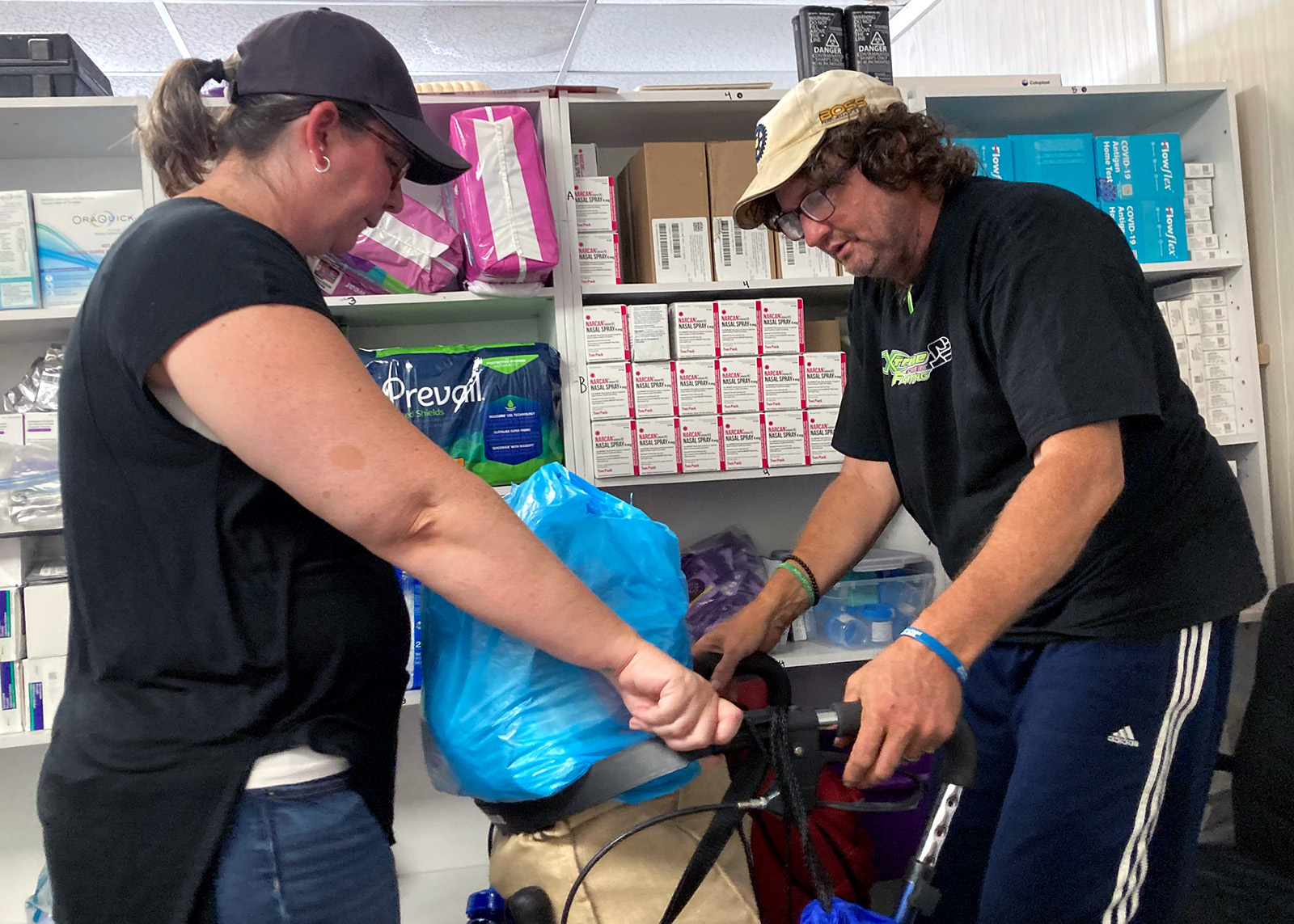
Kent has been unsheltered off and on for a few years, and mostly sleeps outdoors with no tent or shelter. Kent uses a walker and has heart problems. He also has diminished mental capacity due to a brain injury, which has made him eligible to receive disability benefits.
When he first met with the reporter, the weather was warm, and Kent said he didn’t mind sleeping outside.
Asked about his plans for the winter, Kent said he was “working on a place right now.”
Kent explained that Facebook co-founder Mark Zuckerberg had been messaging him on Facebook with this offer: If Kent gave Zuckerberg $500, Zuckerberg would put Kent in a three-bedroom apartment for a year.
Connecting Grounds Pastor Christie Love, who was sitting nearby, gently and repeatedly tried to make Kent understand that the person messaging Kent was probably a scammer and not Mark Zuckerberg.
Love told Kent that anytime someone messages him with some sort of “deal” or asking for money, to let Love know and she’d help him discern if the offer is a scam or not.
“Mark Zuckerbuerg is one of the richest people in the world,” Love told Kent. “He didn’t get rich by taking peoples’ $500 on Facebook. I don’t want to see you get caught, for you to get in trouble and then we get into winter and we’ve put all our hopes into something that turns out to not be anything.
“I don’t want you to be outside this winter,” the pastor said to Kent. “That is my fear. I love you, and you are not in great shape to be outside in the cold.”
Still, Kent did not seem convinced he was being scammed. He thanked Love for caring, but then headed to the bus stop outside the Outreach Center to be on his way.
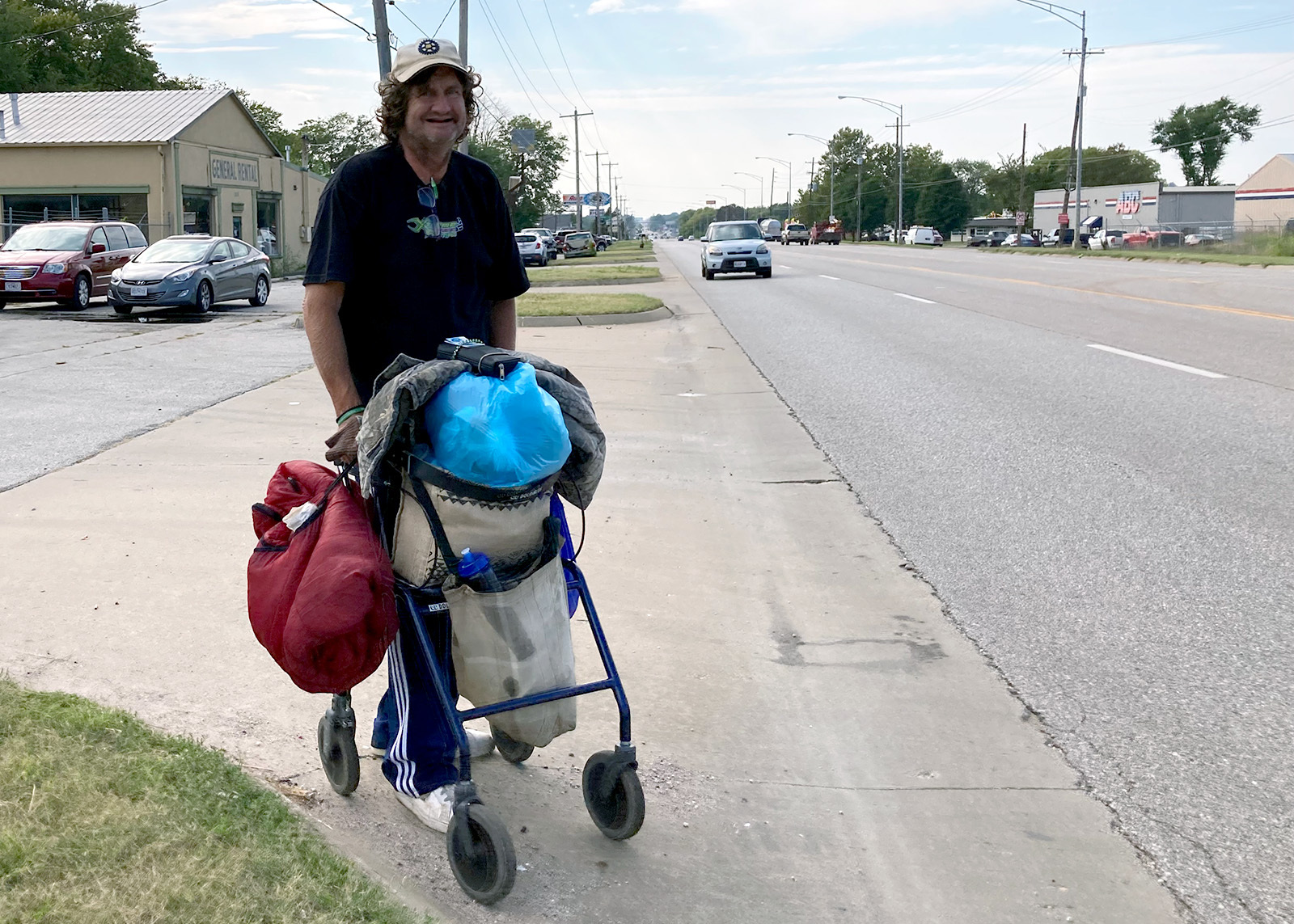
After he left, Love explained that she’s known Kent for about two years. He’s been in and out of assisted care facilities, always leaving on his own accord.
(The Daily Citizen is not publishing Kent’s last name to prevent more scammers from finding him through social media. As of Nov. 27, Kent was still on the streets. Love said he continues to be scammed out of his disability checks. Adult Protective Services is investigating his situation, Love said, but so far no action has been taken.)
Gone in a matter of days
Over the summer of 2023, Kent spent two months at the Connecting Grounds’ medical respite home because he had a large wound on one of his legs. While Kent was at the respite house, Love talked him into saving his disability checks so he could get his own place when his leg healed and he had to leave the respite home.
“Legally, I can’t keep somebody’s money from them, so he called last week and asked for his money, both of his checks,” Love said. “Within two days, all the money was gone — two checks worth $2,200.
“He’s fallen victim to so many women on Facebook,” Love said. “He’s got this one particular girl who he’s convinced that they are engaged and that she is going to buy him a house.
“I see stuff like that all the time,” Love said. “People are lonely and they are desperate for connection and any sense of hope that might come through a relationship or a relationship that may help lead to stability. It’s a very convincing thing.”
Grifters target aging Springfieldians
Linda Hamer is an outreach specialist with Burrell Behavioral Health’s Path program (homeless services). Hamer provides one-on-one outreach and support for unsheltered individuals with mental health issues.
Hamer, too, said she often sees her clients falling victim to scams or exploitation, particularly the elderly.
“They’re easily manipulated. They get their stuff stolen. Their Direct Express cards (for Social Security payments) get taken,” Hamer said. “They’re also vulnerable to scams.”
Hamer said she’s known of people who get scammed into cashing a check for someone — but the check turns out to be fake and the person winds up facing a felony forgery charge.
“And try getting into housing with a forgery charge,” Hamer said.
“People come around and they try to get money from people, you know, and they’re vulnerable to that, because our homeless population is very giving,” Hamer said. “They’ll give the shoes off their feet to somebody who doesn’t have shoes. I’ve seen it happen. And then I’ve argued with that person and said, ‘Now you don’t have shoes.’”
Hypertension, diabetes and malnutrition
Robyn Yost is a certified physician assistant at MSU Care, a clinic in downtown Springfield that provides free health services and medications to uninsured adults, ages 18-64. Yost also volunteers with the Connecting Grounds’ medical outreach team, which goes out every Friday night to provide basic medical care to unsheltered persons and make referrals to the hospitals when necessary.
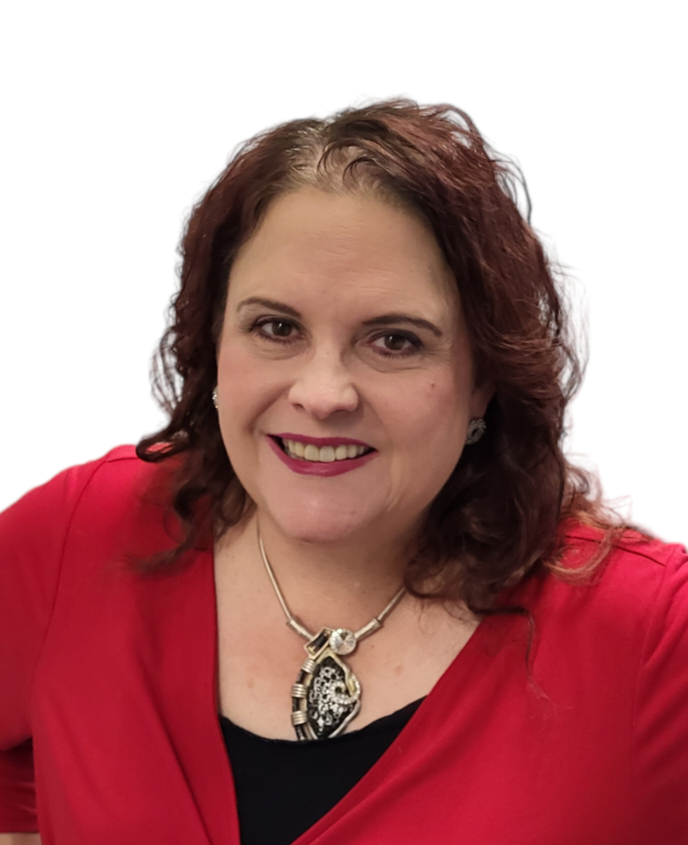
Yost said uncontrolled chronic health conditions, such as hypertension, are rampant among an elderly unsheltered population with no ability to keep medications cool or have regular access to nutritious food.
“Uncontrolled diabetes is actively doing damage to their nervous system, to their heart, to their eyes, to their kidneys,” Yost said. “Insulin has to have a refrigerator. You have to be able to keep that kind of stuff at a certain temperature. You have to be able to see well enough to draw it up (in a syringe) personally. So diabetes is out there doing a lot of damage to these folks.”
Yost said this population is able to find places that serve free meals once or twice a day, but these are not always nutritious foods.
“High carb food is cheap,” she said. “We can make a huge thing of pasta and feed a bunch of people versus serving salads and a healthy protein, something leaner.
“Even if they are getting food, it’s not healthy food,” Yost said. “So malnutrition is another big thing that we see even with some of the obese patients.”
Untreated physical and mental health conditions
Mobility issues are common among the elderly unsheltered, often worsened by the fact that they must walk from place to place, carrying their belongings everywhere they go. Incontinence is common, particularly among elderly women. Dementia and Alzheimer’s, too, are a problem for many on the streets.
“One of the biggest is mental illness,” Yost added. “I frequently come across people that are just screaming and talking to people who aren’t there.”
Reduced hearing or eyesight can pose a multitude of challenges for the elderly unsheltered.
Amputations are common, oftentimes stemming from relatively minor wounds that became infected and spread, or frostbite from being out in the cold.
Sheer exhaustion and lack of sleep coupled with the lack of proper nutrition leave the elderly unsheltered population at higher risk for health complications.
Hamer, with Burrell’s Path program, said many of her older clients have chronic health conditions, but often miss appointments with health care providers because they are in “survival brain.”
“We help them fill out Medicaid applications. We help them make doctor’s appointments and we go with them to doctor’s appointments,” she said. “It’s just hard when you’re constantly worried about where you’re going to sleep, where you’re going to eat, how you can get clean clothes, how you can go to the bathroom — doctor’s appointments don’t seem that important.”
‘I didn’t think this would happen’
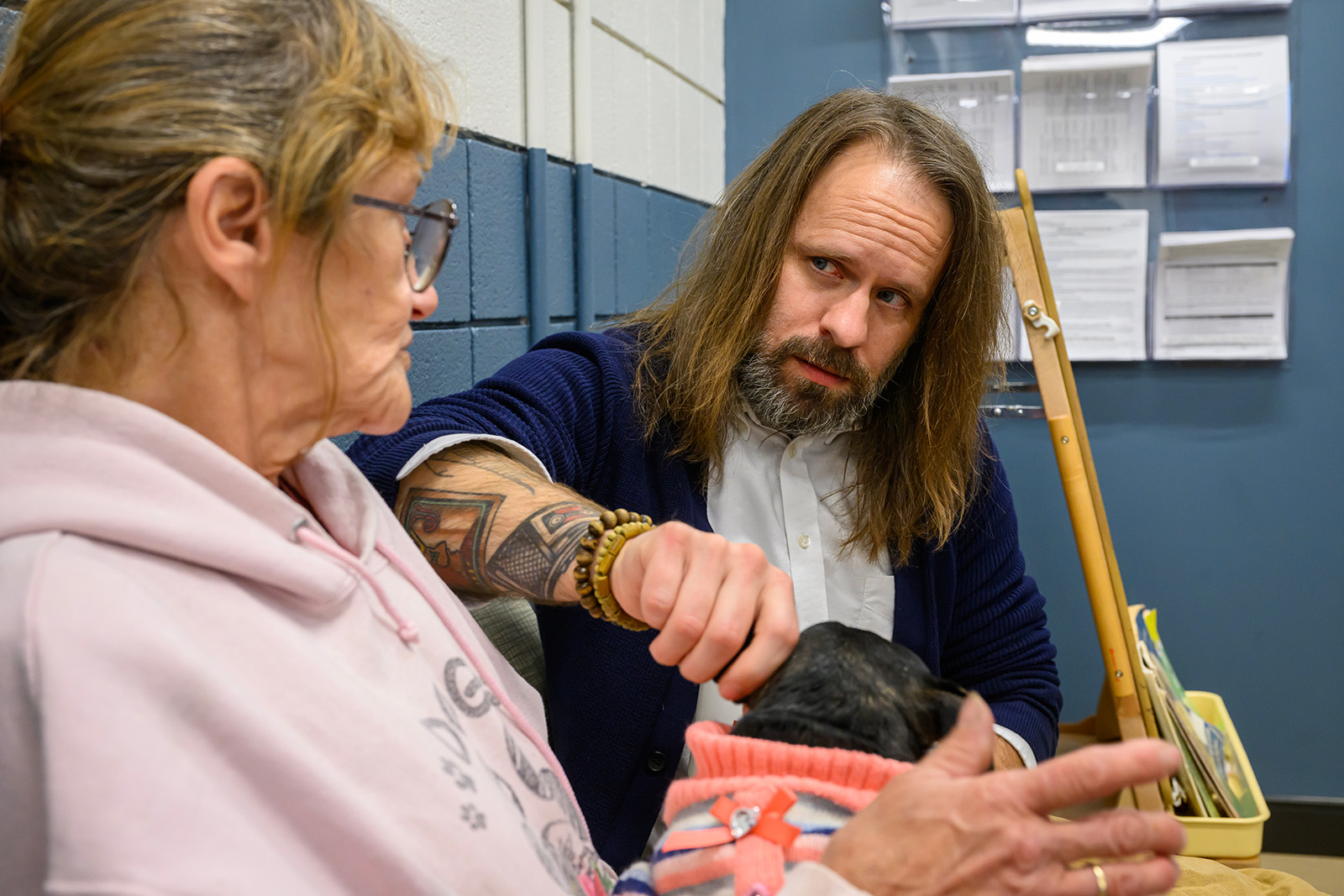
Much like Mark and Patty Arnold, 60-year-old Diana Hopkins spent almost all of her adult life stably housed. For more than decade, she owned a trailer and rented a lot at a trailer park in Springfield.
As often happens with people living in poverty, Hopkins allowed a family member who wasn’t on the lease to move onto the property (into her storage shed). The owners of the trailer park found out someone was living in Hopkins’ shed and evicted her in 2022.
The Daily Citizen first met Hopkins on Oct. 31, when Springfield’s overnight temperatures dipped to a record low. Love, the pastor with the Connecting Grounds, hosted an all-night movie marathon in the basement of a church as a way to provide a warm, safe shelter.

Hopkins explained then how she wrapped her beloved dog, Rollie Pollie, in blankets and handwarmers the previous night to keep warm.
“I didn’t think this would happen,” Hopkins said of becoming homeless.
Throughout her year of homelessness, Hopkins said she relied on the O’Reilly Center for Hope for services.
Located in the former Pepperdine Elementary School at 1518 E. Dale St., the O’Reilly Center for Hope brings together multiple partner agencies in support of helping people attain affordable housing and financial stability. In addition to service providers like One Door, Burrell and Legal Services of Southern Missouri, people can get their mail at the center and use the bathrooms, showers and laundry facilities at no charge.
The Daily Citizen caught up with Hopkins a few weeks after the movie-marathon at the O’Reilly Center for Hope. Hopkins was happy to report that she’d been working with a Burrell case worker and housing specialist, who’d helped Hopkins find a landlord willing to work with her.
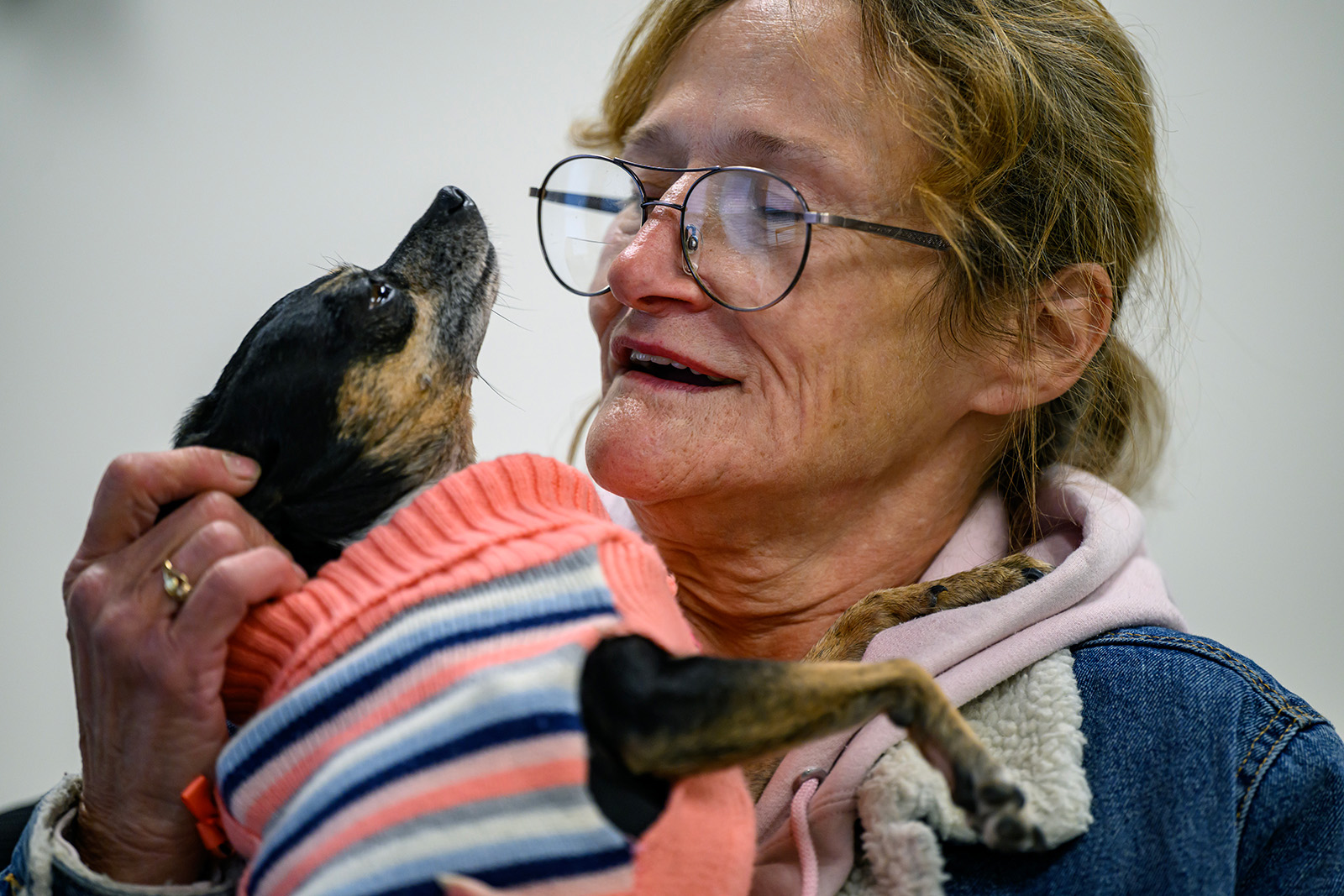
Photographed with Rollie Pollie at One Door at the O’Reilly Center for Hope on E Dale Street in Springfield on Thursday, Nov. 9, 2023. (Photo by Jym Wilson)
Hopkins said she planned to move into a new apartment that weekend.
“I’m happy. She’ll be happy, too,” Hopkins said, petting Rollie Pollie. “I look forward to being able to cook.”

